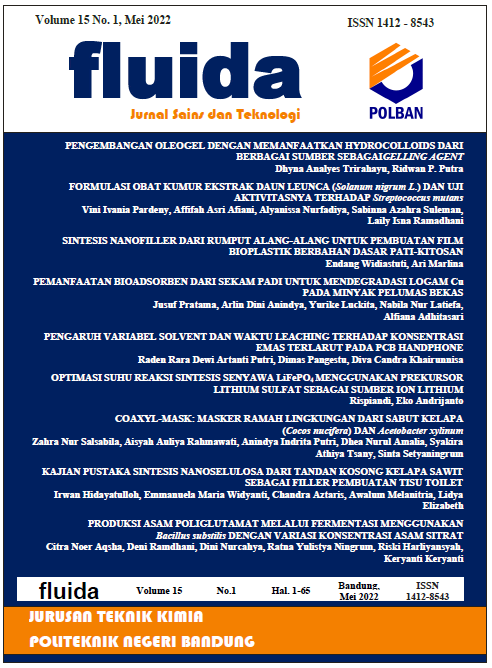Coaxyl-mask: Masker Ramah Lingkungan dari Sabut Kelapa (Cocos nucifera) dan Acetobacter xylinum
Main Article Content
Abstract
Penggunaan masker bagi setiap orang dinilai efektif untuk membatasi penyebaran Covid-19. Namun, permasalahan lingkungan muncul akibat dari banyaknya penggunaan masker karena masker sekali pakai sulit untuk terurai secara alami. Maka dari itu, Coaxyl-mask merupakan inovasi masker sekali pakai yang terbuat dari bioselulosa hasil fermentasi Acetobacter xylinum dan sabut Cocos nucifera. Masker ini terdiri dari 3 lapisan yaitu film bioselulosa yang memiliki sifat water repellent, filter sabut kelapa, dan film bioselulosa sehingga mampu terdekomposisi dengan cepat jika dibandingkan dengan masker sekali pakai pada umumnya. Pada gagasan yang diusulkan ini, perancangan teknik implementasi Coaxyl-mask yaitu dengan melibatkan banyak pihak seperti, pedagang kelapa, produsen masker, tim riset perusahaan medis, dan pabrik independen. Diprediksi masker ini akan memiliki manfaat yang panjang sebagai alat pelindung pada saat pandemi dan mampu menjadi solusi dalam menangani pencemaran atau penimbunan masker seiring dengan jumlah pemakai yang banyak.
Wearing masks has been proven to be the most effective in preventing and minimising the spread of Covid-19. However, there is an environmental risk along with the growing demand of single-use masks. This is caused as the single use mask waste cannot be degraded naturally. Therefore, Coaxyl-mask is a green innovation of masks that is made from biocellulose produced by fermentation of glucose using Acetobacter xylinum and coconut husk waste. This mask is made of three layers of water repellent biocellulose film, a filter made from coconut husk, and another biocellulose film that is non-irritative to the skin. As the materials were made of natural materials, this mask can degrade naturally faster compared to conventional single use masks, so it is environmentally friendly. To implement this idea, there need to be a lot of party involved such as coconut seller, mask producers, medical equipment research team, and independent factories. Because its biodegradable materials, this mask will be a revolutionary invention in medical industry and will be very useful in preventing diseases while saving the environment.
Downloads
Article Details

This work is licensed under a Creative Commons Attribution-ShareAlike 4.0 International License.
An author who publishes in the FLUIDA journal agrees to the following terms:
- Author retains the copyright and grants the journal the right of first publication of the work simultaneously licensed under the Creative Commons Attribution-ShareAlike 4.0 License that allows others to share the work with an acknowledgement of the work's authorship and initial publication in this journal
- Author is able to enter into separate, additional contractual arrangements for the non-exclusive distribution of the journal's published version of the work (e.g., post it to an institutional repository or publish it in a book) with the acknowledgement of its initial publication in this journal.
- Author is permitted and encouraged to post his/her work online (e.g., in institutional repositories or on their website) prior to and during the submission process, as it can lead to productive exchanges, as well as earlier and greater citation of the published work (See The Effect of Open Access).
Read more about the Creative Commons Attribution-ShareAlike 4.0 Licence here: https://creativecommons.org/licenses/by-sa/4.0/.
References
Axmalia, A., Ariyanto, R. (2021). Management of Infectious Household Waste during the Covid-19 Pandemic. Journal of Community Health. 7 (1): 70-76.
Azeredo, H. M. C., Barud, H., Farinas, C. S., Vasconcellos, V. M., dan Claro, A. M. (2019). Bacterial Cellulose as a Raw Material for Food and Food Packaging Applications. Frontiers in Sustainable Food Systems. 3
Cerqueira, J. C., Penha, J. D. S., Oliveira, R. S., Guarieiro, L. L. N., Melo, P. D. S., Viana, J. D., dan Machado, B. A. S. (2017). Production of biodegradable starch nanocomposites using cellulose nanocrystals extracted from coconut fibers. Polímeros, 27(4), 320–329.
Cockburn, H. (2021). Disposable plastic face masks pose huge environmental risks, with 3 million used a minute, researchers warn. URL: https://www.independent.co.uk/news/science/face-masks-coronavirus-plastic-pollution-b1815823.html. Diakses tanggal 11 Agustus 2021.
Global Market Insight. (2020). Will Usage of Abaca Fiber Face Masks during Covid-19 Help to Reduce Wastes during the Pandemic? https://www.globaltrademag.com/will-usage-of-abaca-fiber-face-masks-during-covid-19-help-to-reduce-wastes-during-the-pandemic/. Diakses tanggal 12 Agustus 2021
Gustavia, C. 2020. Peran dan Efektivitas Masker dalam Pencegahan Penularan Corona Virus Disease 2019 (Covid-19). Jurnal Media Hutama. 2 (1): 412-418.
Mohammad, S., Rahman, N., Khalil, M., dan Abdullah, S. 2014. An Overview of Biocellulose Production Using Acetobacter xylinum Culture. Advances in Biological Research. 8(6): 307-313.
Oluniyi, F., Elvis, O. (2020). Covid-19 face masks: A potential source of microplastic fibers in the environment. Science of the Total Environment. 737
Potivara, K., dan Phisalaphong, M. (2019). Development and Characterization of Bacterial Cellulose Reinforced with Natural Rubber. Materials (Basel). 12(14): 2323
Prasetiawan, T. (2020). Permasalahan Limbah Medis Covid-19 di Indonesia. Kajian Singkat Terhadap Isu Aktual dan Strategis. 7 (9):13.
Pratiwi, H.W. (2021). Bahaya Plastik Terselubung pada Masker Medis. URL: https://kumparan.com/wijayantiherlisp/bahaya-plastik-terselubung-pada-masker-medis-1wC546BXgs2/full. Diakses tanggal 13 Agustus 2021.
Rosa, M., Medeiros, E., Malmonge, J., Gregorski, K., Wood, D., Mattoso, L., Glenn, G., Orts, W., dan Imam, S. (2010). Cellulose nanowhiskers from coconut husk fibers: Effect of preparation conditions on their thermal and morphological behavior. Carbohydrate Polymers, 81(1), 83–92.
Rusdiana, H., Kusnanto, H., Siwi, R. 2014. Medical Solid Waste Burning Policy with Incenerator at RSUD. Dr H. Moch Ansari Saleh Banjarmasin. Jurnal Kebijakan Kesehatan Indonesia. 3 (1): 19-23.
Susilo, A., Rumende, CM., Pitoyo, CW., Santoso, WD., Yulianti, M., Herikurniawan, Sinto, R., Singh, G.,Nainggolan, L., Nelwan, EJ., Chen, LK., Widhani, A., Wijaya, E., Wicaksana, B., Maksum, M., Annisa, F., Jasirwan, COM., and Yunihastuti, E. (2020). Coronavirus disease 2019: Tinjauan literatur terkini. Jurnal Penyakit Dalam Indonesia. 7(1): 45-67.

